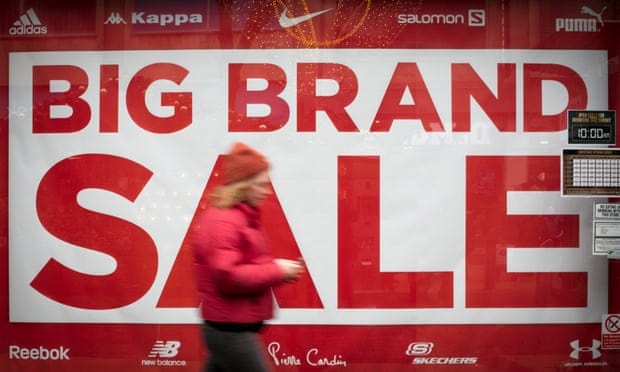No-deal threat has taken toll on business and consumer confidence
Brexit uncertainty has pushed the UK economy to the brink of a recession, according to a Guardian analysis of economic news over the past month.
The odds were evenly balanced that the economy would slide into two consecutive quarters of contraction – the definition of a recession – as the threat of a no-deal Brexit took its toll on business and consumer confidence.
The economy contracted by 0.2% in the second quarter of the year. Predictions for the three months to the end of September vary from a second contraction of 0.2%, which would fulfil the criterion of a recession, to a positive o.2%.
Analysts said the troubled UK economy was slowing against the backdrop of Donald Trump’s trade war with China, which has dragged on global growth more than was expected in February 2018 when the US president first threatened Beijing with higher import tariffs.
The tariffs directly affect only a relatively small percentage of global trade but Washington’s persistent threats to widen their scope and target the EU and India have had a chilling effect on business investment and manufacturing production.
Germany is poised to enter a recession, China’s economic growth has stalled and while GDP is still expanding in the US , growth has slowed to half the rate it enjoyed 18 months ago.
Uncertainty surrounding Britain’s exit from the EU has added to the growing fear of a more comprehensive global downturn that could push the world economy into recession, possibly as early as next year.
The incoming boss of the International Monetary Fund, Kristalina Georgieva, said earlier this week that a fresh global economic downturn was on the horizon.
She said faltering economic growth, trade tensions and historically high debt levels put the IMF on alert for a global downturn that could increase unemployment and inequality.
The UK government’s response came on 4 September when Sajid Javid promised the largest increase in public spending in more than 15 years. The chancellor outlined a £13.8bn package that committed the government to a 4.1% increase in expenditure from 2019-20 to 2020-21.
As an attempt to draw a line under the era of austerity, analysts said it fell well short of its objective but the extra spending on the police, health service and schools and a boost for public infrastructure made clear ministers were prepared to break their own spending rules to maintain economic growth.
Writing in the Guardian, David Blanchflower, a former member of the Bank of England’s interest rate setting committee, said the parallels with the period before the banking crash in 2008 were too close to ignore.
He said a decline in consumer sentiment reported in European commission surveys was startling and showed public was become increasingly nervous about the future.
He said: “Of particular note are the reports of consumers in that EU survey. Since 1985 the series average is -12. In August 2019 the series fell to a low of -36; it was -34 in April 2008. Consumers are also expecting a big rise in unemployment.”
Blanchflower, a professor of economics at the Ivy League Dartmouth College in the US, was the only member of the monetary policy committee to vote for interest rate cuts in early 2008, well ahead of the Lehman Brothers collapse in September that year.
He said the Bank of England was repeating the same mistake by waiting until a downturn is crystal clear before acting to avoid it.
The Treasury and the Bank have pointed to the labour market as an indicator of the UK’s underlying strength. During his speech in the Commons to announce a jump in government spending, Javid said several years of record employment and low unemployment have begun to feed through into higher wages, which last month hit 4%.
However, redundancies among retail workers, a decline in job vacancies and a slowing in the rate of job hiring, has revealed a weaker employment market compared with earlier in the year.

